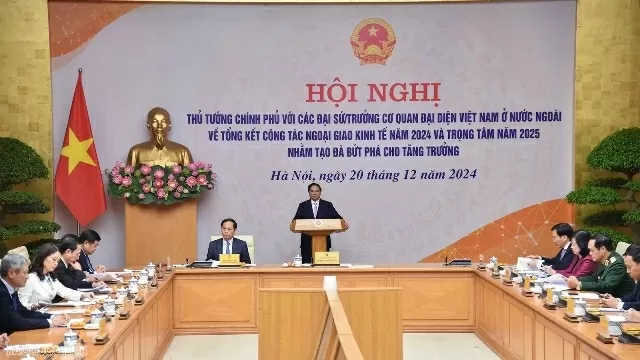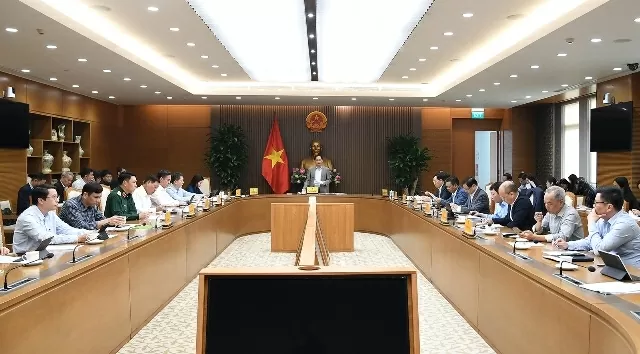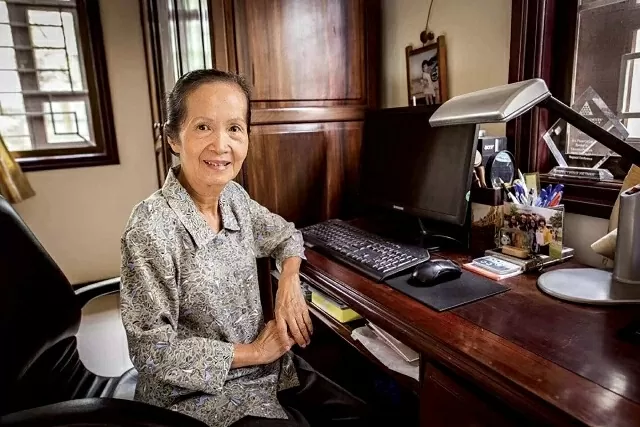
Economic diplomacy plays a vital role in Vietnam's international integration: Expert
Latest
 |
| Economic diplomacy plays a vital role in Vietnam's international integration: On the afternoon of December 20, 2024, at the Government Office, Prime Minister Pham Minh Chinh chaired a conference with Vietnamese ambassadors and heads of diplomatic missions abroad to review economic diplomacy efforts in 2024 and set strategic priorities for 2025, aiming to create momentum for breakthrough growth. (Photo: Tuan Anh) |
When asked about the role of diplomacy, especially economic diplomacy, in Vietnam’s international economic integration, Ms. Pham Chi Lan reflected on the pivotal decisions made during the Doi moi process. From the early days of reform, Vietnam’s diplomatic sector chose the right direction—prioritizing economic diplomacy to implement the country’s reform agenda, starting with economic system transformation. This transition was anchored by three key pillars: the move away from a centrally planned economy to a market-oriented one, the development of a multi-sector economy, and the opening of Vietnam’s markets to the world.
Diplomacy, she explained, became one of the pillars of the Doi moi process. In those foundational years, economic diplomacy played a crucial role in building bridges with international organizations, countries, and experts, connecting Vietnam with valuable external resources. These connections helped guide Vietnam’s institutional transformation and set the stage toward market-based reform. According to Ms. Chi Lan, foreign support obtained through diplomatic channels helped Vietnam develop a modern legal and policy framework to align with a market economy, build trust with the international community, and demonstrate that the country’s Đổi mới (Renovation) process is “irreversible”.
She also recounted the milestones of Vietnam’s integration efforts: its accession to the Association of Southeast Asian Nations (ASEAN) in 1995 and the World Trade Organization (WTO) in 2007. The integration process has since expanded across all sectors, especially in economic and trade integration, which has provided a strong foundation for robust development. After joining the WTO, Vietnam began negotiating next-generation Free Trade Agreements (FTAs), expanding into multilateral frameworks and deepening bilateral ties with key economic partners.
Building on the momentum of the Comprehensive and Progressive Agreement for Trans-Pacific Partnership (CPTPP), Vietnam accelerated negotiations with the European Union, leading to the signing of the EU-Vietnam Free Trade Agreement (EVFTA) and the EU-Vietnam Investment Protection Agreement (EVIPA). This was followed by the Regional Comprehensive Economic Partnership (RCEP), linking ASEAN with five major partners: China, South Korea, Japan, Australia, and New Zealand. Vietnam has now established comprehensive strategic partnerships with some of the world’s largest economies and engaged with critical economic regions globally. Lan emphasized that the role of the diplomatic sector was indispensable, especially in FTA negotiations and broader integration efforts.
 |
| Economic diplomacy plays a vital role in Vietnam's international integration: Deputy Prime Minister Bui Thanh Son chairs a meeting of the Task Force on strengthening cooperation and proactively responding to adjustments in U.S. economic and trade policy, April 8. (Source: VGP) |
At the 2024 National Conference on Economic Diplomacy, Prime Minister Pham Minh Chinh praised economic diplomacy as a key highlight in Vietnam’s external affairs. Commenting on this, economist Pham Chi Lan noted that economic diplomacy had made vital contributions to the country’s socio-economic development in recent years—especially amid global uncertainty.
She observed that Vietnam’s diplomatic sector, particularly its economic diplomacy efforts, had played a crucial role in providing timely information, monitoring global developments, and issuing early warnings. These efforts allowed government ministries, industries, associations, and businesses to proactively prepare for shifts in international trade dynamics.
One clear example she cited was the swift and skillful response following former U.S. President Donald Trump’s announcement of reciprocal tariffs targeting imports from a number of countries, including Vietnam. The Ministry of Foreign Affairs had closely monitored the situation in the U.S. and worked through various channels to support Vietnam’s interests and facilitate tariff negotiations.
She emphasized the tactful and effective manner in which Vietnamese diplomacy handled the situation. Notably, just two days after the U.S. announced its tariff policy (on April 2), General Secretary To Lam was among the first foreign leaders to hold a phone conversation with President Trump (on April 4), during which they discussed ways to resolve trade tensions and promote fair, sustainable, and mutually beneficial economic cooperation. This move was well received by both domestic and international observers.
Within 24 hours of the U.S. tariff announcement, Prime Minister Pham Minh Chinh convened an emergency meeting of the government’s standing committee. A special task force, led by Deputy Prime Minister and Foreign Minister Bui Thanh Son, was established immediately. This was followed by a negotiation delegation headed by Deputy Prime Minister Ho Duc Phoc, who traveled to the U.S. as the Special Envoy of the General Secretary.
Ms. Pham Chi Lan highlighted that Vietnam’s foreign affairs apparatus is becoming increasingly dynamic, creative, and proactive. Diplomats had orchestrated a remarkable number of high-level meetings between Vietnamese leaders and their counterparts from foreign governments, major corporations, and international organizations—across both bilateral and multilateral platforms. According to her, never before had Vietnam’s foreign affairs, especially at the top leadership level, been so active and widespread across continents and global forums. It was as if nations around the world were eager to engage with Vietnam at precisely this moment, to join hands in fulfilling the country’s aspirations in a new era of national growth.
She further noted that economic diplomacy had strongly supported various sectors, localities, and businesses in expanding international cooperation. Working alongside the Ministry of Industry and Trade, Vietnam’s overseas Trade Offices and diplomatic missions had been highly active, helping industry associations and exporters access vital market information, offering strategic advice, identifying solutions to trade difficulties, and seeking new potential export markets. These agencies also played a critical role in defending the legitimate interests of Vietnamese enterprises in international trade disputes.
Before taking up overseas assignments, heads of Vietnam’s diplomatic missions routinely hold consultations with domestic ministries, local governments, businesses, and associations to gather feedback, requests, and “orders” for concrete objectives—an approach she deemed practical and effective.
Economic diplomacy had also played a valuable role in supporting local governments and enterprises to integrate more deeply into the global economy, attract foreign direct investment (FDI), and promote Vietnam’s national brand and international image. Diplomatic missions abroad had been proactive in organizing activities related to economic diplomacy, trade promotion, investment, and tourism, thus creating more opportunities for localities and businesses to engage in both domestic and international promotion efforts.
 |
| Economic diplomacy plays a vital role in Vietnam's international integration: Economist Pham Chi Lan. (Photo: WVR) |
In 2025, the global economic and trade landscape is marked by heightened volatility, particularly in the area of tariffs, creating complex challenges. When asked about how Vietnam’s economic diplomacy should adapt in response, Ms. Phạm Chi Lan emphasized that recent tariff policies introduced by President Donald Trump have made it clear: if Vietnam fails to move beyond the role of a low-value processing economy, we may no longer export to the U.S. market. Currently, U.S. authorities suspect that Vietnam may be serving as a hub for origin circumvention. This means that negotiations now require not only discussions about tariffs, but also transparent explanations to reassure the U.S. about the nature of Vietnamese business practices—preventing misunderstandings that could lead to punitive tariff measures.
She acknowledged this as a difficult period, but also as a wake-up call—especially in Vietnam’s trade relations with the U.S. While Vietnam has signed free trade agreements (FTAs) with 17 countries, it has none with the U.S. The bilateral trade relationship remains governed by the Vietnam–U.S. Bilateral Trade Agreement (BTA) signed in 2001 and the BTA+ in 2006, prior to Vietnam’s WTO accession. Therefore, she stressed the need to accelerate negotiations so that Vietnam could engage with the U.S. as if under an FTA—covering not only tariff but also non-tariff barriers—from both sides. The foreign affairs sector, when participating in these negotiations, must take this factor into account.
In addition, the world is changing rapidly—not only in the U.S. but in many countries where leadership, policy directions, and ruling parties are shifting. In light of this, Vietnam’s overseas missions must closely monitor, analyze, research, and forecast developments in order to provide timely information and policy advice to domestic ministries, agencies, businesses, and localities—ensuring readiness and responsiveness.
Finally, Ms. Pham Chi Lan suggested that the diplomatic sector consider studying and piloting a “technology ambassador” role, taking inspiration from Denmark. Given the increasing importance of technology in the global economy—and the Vietnamese Politburo’s issuance of Resolution No. 57-NQ/TW on breakthroughs in science, technology, innovation, and digital transformation—this could be a strategic step forward. She noted that General Secretary To Lam had recently referred to this resolution as one of the four key pillars for Vietnam’s future growth. In her view, in order for Vietnam to master digital technologies and advance in the new era, the country must cultivate and deploy “technology ambassadors” to support that mission.
Relate News














